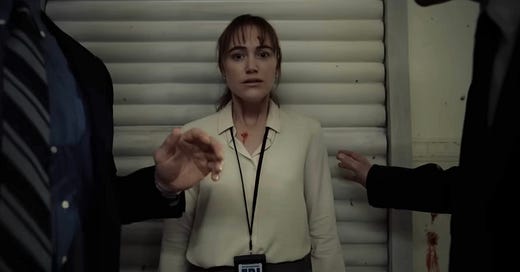I’m a little bit of a horror aficionado. I like the odd horror novel, the odd horror movie. I’m selective about it though. Splatter porn films like Hostel or most of the Saw films are a bit bland for me; unless it has a comedy angle (like, say, The Evil Dead franchise) there has to be something deeper in the spine of the film, something a bit more psychological about it.
Mostly I love science-fiction horror. Event Horizon is a favourite. Nope was my favourite film of 2022. I’d probably call 1979’s Alien my favourite horror movie of all time; I’m psyched for Fede Alvarez’ take on the franchise, Alien: Romulus, which opens week after next.
And I like crime- or serial killer-based horror. So you can imagine I was excited about going along to see Oz Perkins’ new film Longlegs - a psychological horror with a satanic serial killer bent and a gonzo performance from Nicolas Cage.
So why can’t I stop thinking about a David Fincher film from 1995?
Back in the mid-1990s, there was one mainstream serial killer horror movie to rule them all, and that movie was Seven, the David Fincher film that helped advance Brad Pitt as the leading man of a new era, and that spawned the line ‘whats in the box?!’, repeated the world over by 90s kids receiving gifts.
(It was also typecast on some posters as Se7en, leading me and a friend of mine to refer to it as ‘Sesevenen’ for a number of years.)
Seven - or Se7en if you prefer - was a film custom-made to make you uncomfortable, and it can still make you horribly uncomfortable if you watch it now, given the prominent role filled by Kevin Spacey. Heck, even setting aside the vaguely satanic motivations of the killer, the opening scenes feature a dead obese man’s genitals, a later scene has a corpse seeming to come back to life, and another implies a sex act gone very horribly wrong.
Or very horribly right, if you’re the killer.
It also benefited from an ascendant director in David Fincher. The style that Fincher employed here has made him almost a genre unto himself, carrying on through later films like Fight Club, Gone Girl and Zodiac. Fincher has a history of working with the same people on every film - sound designer Ren Klyce, cinematographers Darius Khondji and Jeff Cronenweth, editor Angus Wall and, more recently, composers Trent Reznor and Atticus Ross.
In a sense, Fincher is a modern day auteur, a director who comes as a complete package. If you hire David Fincher, or green light one of his scripts, you know what sort of movie you’re going to get. Not just a good drama, or an above-average crime thriller. You’re getting a David Fincher movie.
For me, personally, I’ve grown up with Fincher’s style as a massive influence on what I like in a crime horror. Its a film that has a distinct visual style. A film that knows when to pull back the curtain, but understands not showing something is powerful too. Score is key. Lighting is key. Performance is key. And breaking established film form - primarily through camera work - is good too.
In that sense, Longlegs was a massive success. It looks stunning, its shot brilliantly, and the score - minimal as it was - was perfect. Oz Perkins’ has always had a bit of Fincher about him, and it was on full display here.
Well … okay, maybe too much full display.
Let me say that I enjoyed Longlegs. It was a well written film, a helluva yarn from Perkins, and the cast sold it for the most part; Maika Monroe’s gifted-genius performance in the lead role was a bit quirky, but she was surrounded by aces like Blair Underwood and Alicia Witt, so that softened the edges.
The sense of dread in the film - far more than any sense of horror - drove the narrative forward; it was pretty clear early on where this was all heading so all we could do is sit and wait for this horrific thing to happen in front of us. To us.
I also think that pre-release media hype surrounding Nicolas Cage (“as you’ve never seen him before”) probably hurt the film a little. He looked weird and he acted weird, but he was fine. In truth, given how different he was to the rest of the cast, it was like he was an character imported from a different movie.
So why can’t I stop thinking about Seven when I think about Longlegs?
I think Perkins intended at least some of Longlegs to be an homage to Seven. There are two moments that convinced me of this: a scene set late night in a dark library that evoked a similar scene featuring Morgan Freeman in a library (set to Bach's beautiful Air on the G String), and the film credits rolling down from the top of the screen, something I first saw done by Seven.
Once I read these two moments to be homages to the earlier film, my brain fixated on everything else similar between the two movies - unavoidable given that both focus on the hunt for a serial killer with satanic overtones.
What’s in the box? It might be Nic Cage in makeup.
Have you seen Longlegs? What did you think?
And are you as enamoured by Seven as I am?
Thanks for reading, e hoa.
See you tomorrow for more Nature’s Best hijinks!
Cheers, Chris'






